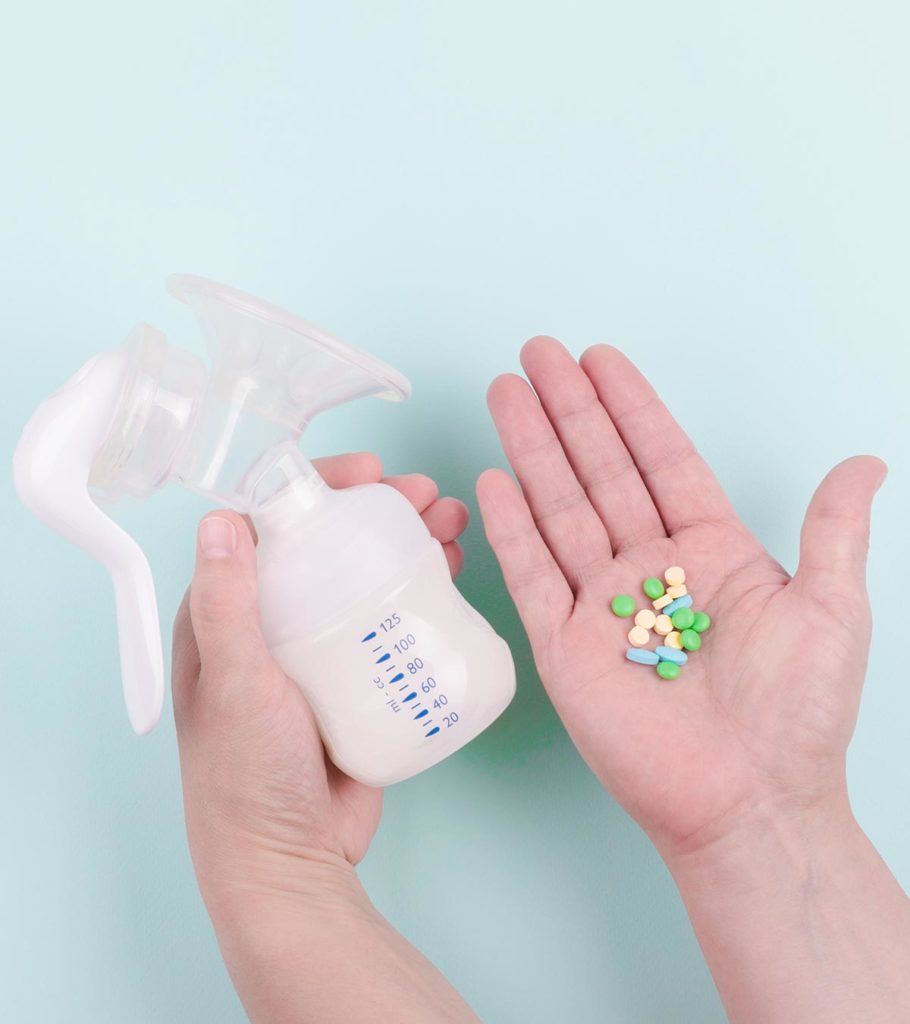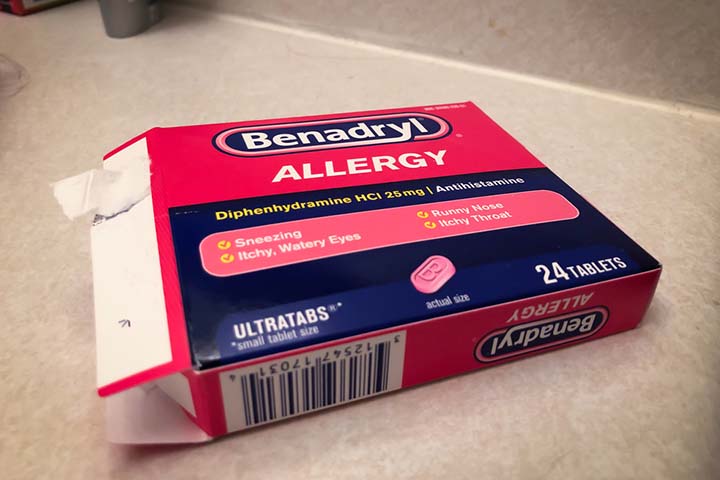Benadryl is an over-the-counter (OTC) syrup commonly used by people to alleviate the symptoms of cough or as an antihistamine to improve the symptoms of skin irritation. However, maintain caution as Benadryl while breastfeeding may be unsafe as it has mild sedative properties and may pass into the baby through the breastmilk. Keep reading this post to know whether or not can you take Benadryl while breastfeeding, its ingredients, safety, side effects, and alternatives for nursing mothers.
What Is Benadryl?
Benadryl is an over-the-counter (OTC) brand of medicines sold to treat a variety of conditions ranging from coughing to skin allergies. It is available in topical and oral forms. Topical Benadryl is used for treating skin allergy symptoms such as skin rashes and itching. Oral Benadryl is available as capsules, chewable tablets, and syrup that are used for treating cold, cough, and allergy symptoms such as a runny nose, itchy throat, etc.
A variant of Benadryl syrup is also used specifically to provide relief from cough and soothe a sore throat.
What Are The Ingredients Of Benadryl?
The primary, active ingredient of most Benadryl products is diphenhydramine. It belongs to a class of compounds called antihistamines, which are used to relieve a wide range of allergy symptoms (1). Antihistamines block the action of histamine, a molecule within the body responsible for triggering allergy symptoms.
The body absorbs diphenhydramine from Benadryl either through the skin or the stomach depending on the mode of administration. Blood carries diphenhydramine to different parts of the body, including the breast tissue, from where it can find its way into breast milk.
Is It Safe To Have Benadryl When Breastfeeding?
If you are wondering ‘can I take benadryl while breastfeeding,’ the answer is yes. But here is something you need to know before using Benadryl when you are lactating.
- A single occasional dose is safe: A single dose of Benadryl, such as before bedtime and after the last feed of the day, is unlikely to cause any problems for the baby (2). Diphenhydramine is one of the older or first-generation antihistamines that rarely cause any serious medical problems among breastfeeding babies, especially when the dosage is minimal and occasional (3).
- May affect when lactation is not established: Medical experts state that a dose of diphenhydramine may cause problems to the baby and the mother if lactation is not established (2). It takes about 4-6 weeks for the baby and the mother’s body to get used to breastfeeding (4). So it is best not to have Benadryl unless your baby is 4-6 weeks old. However, the appropriate age may vary, and it is best to consult a doctor before you take the medicine.
- A combination with some drugs may cause problems: If you are on any other medication, do not have Benadryl without taking your doctor’s advice. Diphenhydramine from Benadryl may react with compounds from other medicines to cause side effects. For example, a class of drugs called sympathomimetic drugs may react with antihistamines leading to health complications for the mother and the baby (2).
- Prolonged use, multiple doses can cause side effects: Like any other medicine, large doses of Benadryl and prolonged/regular use will cause side effects in breastfeeding babies. The mother may also experience side effects like a decrease in breast milk production.
Benadryl does have a potential to cause side effects in babies, and it is vital to know all about it.
Can Benadryl Cause Side Effects In Babies?
Yes. The following are the possible side effects of maternal Benadryl usage on the breastfeeding infant.
- Irritability and colic: In a study about first-generation antihistamines, researchers found that about 10% of mothers who had a drug with antihistamine reported colic and irritability in their babies. The precise dosage of antihistamine is unknown, and so is the duration of the side effect. However, none of the side effects required medical attention, and the baby stayed healthy.
- Drowsiness: A study reported drowsiness in 1 out of 12 breastfeeding infants whose mothers had diphenhydramine dosage. The side effects were not serious. Nevertheless, you must observe the baby for signs of drowsiness, since diphenhydramine is known to induce sleep (5).
Always consult your doctor before having any medicine during lactation, keeping in mind the health of the baby. Compounds found in Benadryl could react with some other medication that you are on.
Also, talk to your doctor about using alternatives to Benadryl.
What Are The Alternatives To Benadryl?
The alternatives to Benadryl vary depending on why you are using the medicine. The following are some of the baby-safe substitutes for Benadryl:
- Loratadine-based medicine: Loratadine is a drug that can help provide allergy relief. Maternal dosage is not known to cause any problems in the breastfeeding infant (6). In any case, the lowest dose of the medicine is recommended. Also, just like diphenhydramine from Benadryl, you should avoid having the medicine in combination with sympathomimetic drugs such as pseudoephedrine.
- Acetaminophen and ibuprofen: These drugs are among the safest for breastfeeding mothers and their babies (7) and can be used to reduce the irritation associated with a sore throat, fever, and cold. Even when the maternal dosage is higher than usual, the amount that goes into breast milk is a lot less (8) (9).
- Home remedies: Instead of using Benadryl for treating a cough, you can use home remedies such as a ginger-honey mix, warm water gargles, and warm broth/soup. Skin irritation can be relieved with the use of aloe vera gel and keeping the skin hydrated. Speak to your doctor about appropriate remedies and lifestyle changes that can help you feel better without the use of medication.
Breastfeeding is the phase when the mother is apprehensive about taking medications for any ailments. If you wonder about taking Benadryl while breastfeeding, then know that this medication might be safe when taken in moderation and as per a doctor’s guidance. Nevertheless, you may aim at avoiding Benadryl while breastfeeding due to the drug interactions, possible side effects, and other complications. However, if you are advised to take this medication, talk to your doctor about the recommended dosage and other vital aspects to prevent any adverse effects on your baby.
Key Pointers
- Benadryl is an antihistamine used to treat allergic reactions, skin irritation, and rashes.
- Occasional use of Benadryl is safe with medical advice but should not be used for 3 to 4 weeks after delivery as it may affect lactation.
- The drug may cause side effects such as irritability and drowsiness in the nursing baby.
- Alternatives to Benadryl, such as nasal sprays, ginger-honey tea, and warm gargles, are safer remedies for managing allergy symptoms while breastfeeding.
- It is highly recommended to consult a doctor before taking any Benadryl while breastfeeding.















